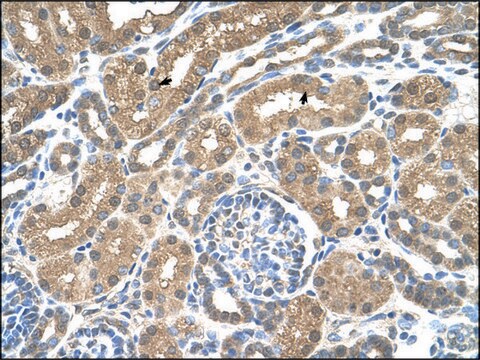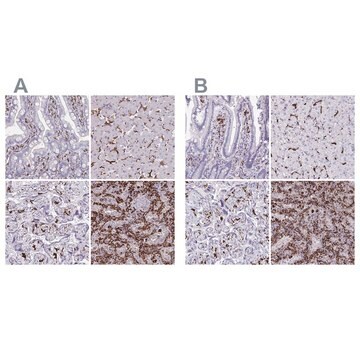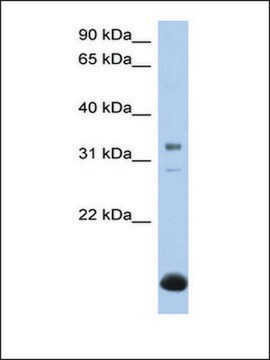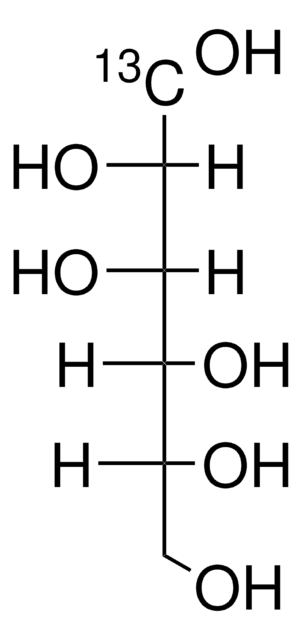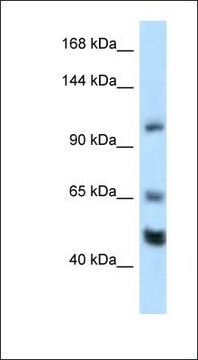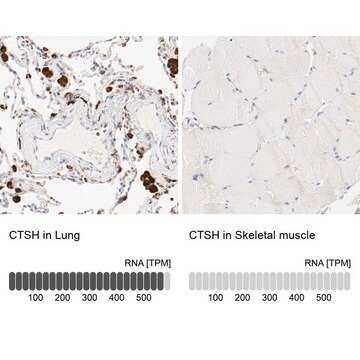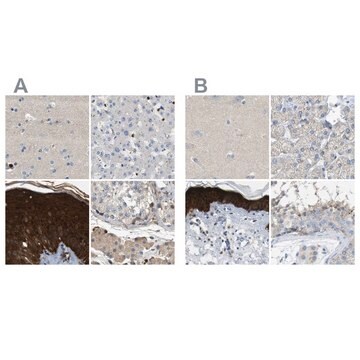추천 제품
생물학적 소스
rabbit
Quality Level
결합
unconjugated
항체 형태
affinity isolated antibody
항체 생산 유형
primary antibodies
클론
polyclonal
양식
buffered aqueous solution
분자량
46 kDa
종 반응성
human, bovine, dog, rabbit, rat, pig, horse
농도
0.5 mg - 1 mg/mL
기술
immunohistochemistry: suitable
western blot: suitable
NCBI 수납 번호
UniProt 수납 번호
배송 상태
wet ice
저장 온도
−20°C
타겟 번역 후 변형
unmodified
유전자 정보
human ... ARRB2(409)
일반 설명
Arrestin, β 2 (ARRB2), belongs to the arrestin family and suppresses cellular responses by desensitization of G-protein coupled receptor (GPCR). It also blocks β-adrenergic-mediated functions. Genetic variations in ARRB2 have been associated with Alzheimer′s disease and tardive dyskinesia.
Rabbit Anti-ARRB2 antibody recognizes pig, rabbit, canine, chicken, mouse, human, rat, bovine, and zebrafish ARRB2.
Rabbit Anti-ARRB2 antibody recognizes pig, rabbit, canine, chicken, mouse, human, rat, bovine, and zebrafish ARRB2.
면역원
Synthetic peptide directed towards the middle region of human ARRB2
애플리케이션
Rabbit Anti-ARRB2 antibody is suitable for western blot applications at a concentration of 1μg/ml. It can also be used for IHC applications at 4-8μg/ml.
생화학적/생리학적 작용
Members of arrestin/beta-arrestin protein family are thought to participate in agonist-mediated desensitization of G-protein-coupled receptors and cause specific dampening of cellular responses to stimuli such as hormones, neurotransmitters, or sensory signals. ARRB2, like arrestin beta 1, was shown to inhibit beta-adrenergic receptor function in vitro. It is expressed at high levels in the central nervous system and may play a role in the regulation of synaptic receptors. Besides the brain, a cDNA for arrestin beta 2 was isolated from thyroid gland, and thus it may also be involved in hormone-specific desensitization of TSH receptors.Members of arrestin/beta-arrestin protein family are thought to participate in agonist-mediated desensitization of G-protein-coupled receptors and cause specific dampening of cellular responses to stimuli such as hormones, neurotransmitters, or sensory signals. Arrestin beta 2, like arrestin beta 1, was shown to inhibit beta-adrenergic receptor function in vitro. It is expressed at high levels in the central nervous system and may play a role in the regulation of synaptic receptors. Besides the brain, a cDNA for arrestin beta 2 was isolated from thyroid gland, and thus it may also be involved in hormone-specific desensitization of TSH receptors. Multiple alternatively spliced transcript variants have been found for this gene, but the full-length nature of some variants has not been defined.
서열
Synthetic peptide located within the following region: RLVIRKVQFAPEKPGPQPSAETTRHFLMSDRSLHLEASLDKELYYHGEPL
물리적 형태
Purified antibody supplied in 1x PBS buffer with 0.09% (w/v) sodium azide and 2% sucrose.
면책조항
Unless otherwise stated in our catalog or other company documentation accompanying the product(s), our products are intended for research use only and are not to be used for any other purpose, which includes but is not limited to, unauthorized commercial uses, in vitro diagnostic uses, ex vivo or in vivo therapeutic uses or any type of consumption or application to humans or animals.
적합한 제품을 찾을 수 없으신가요?
당사의 제품 선택기 도구.을(를) 시도해 보세요.
Storage Class Code
10 - Combustible liquids
WGK
WGK 3
Flash Point (°F)
Not applicable
Flash Point (°C)
Not applicable
가장 최신 버전 중 하나를 선택하세요:
Teng Jiang et al.
Current Alzheimer research, 11(4), 408-412 (2014-03-19)
Emerging evidence indicates that β-arrestin 2, an important regulator of G protein coupled receptors, is involved in the pathogenesis of Alzheimer's disease (AD). The aim of this study was to investigate the association between β-arrestin 2 gene (ARRB2) variation and
Y-J Liou et al.
European journal of neurology, 15(12), 1406-1408 (2008-12-04)
Tardive dyskinesia (TD) is a severe and potentially irreversible adverse effect of long-term antipsychotic treatment. Typical antipsychotics are commonly binding to the dopamine receptor D2 (DRD2), but the occurrence of antipsychotic-induced TD is rather delayed; therefore, the development of TD
자사의 과학자팀은 생명 과학, 재료 과학, 화학 합성, 크로마토그래피, 분석 및 기타 많은 영역을 포함한 모든 과학 분야에 경험이 있습니다..
고객지원팀으로 연락바랍니다.